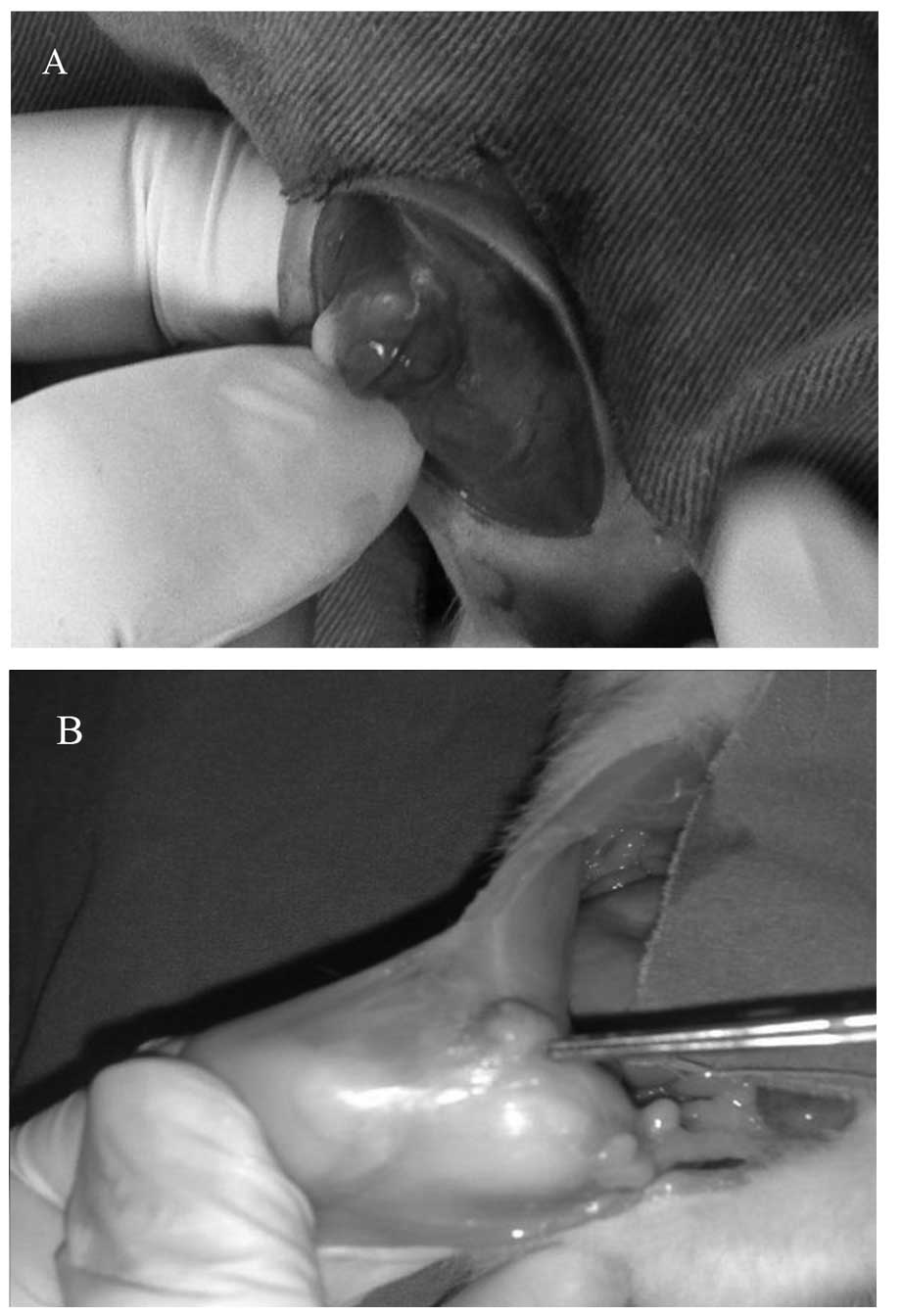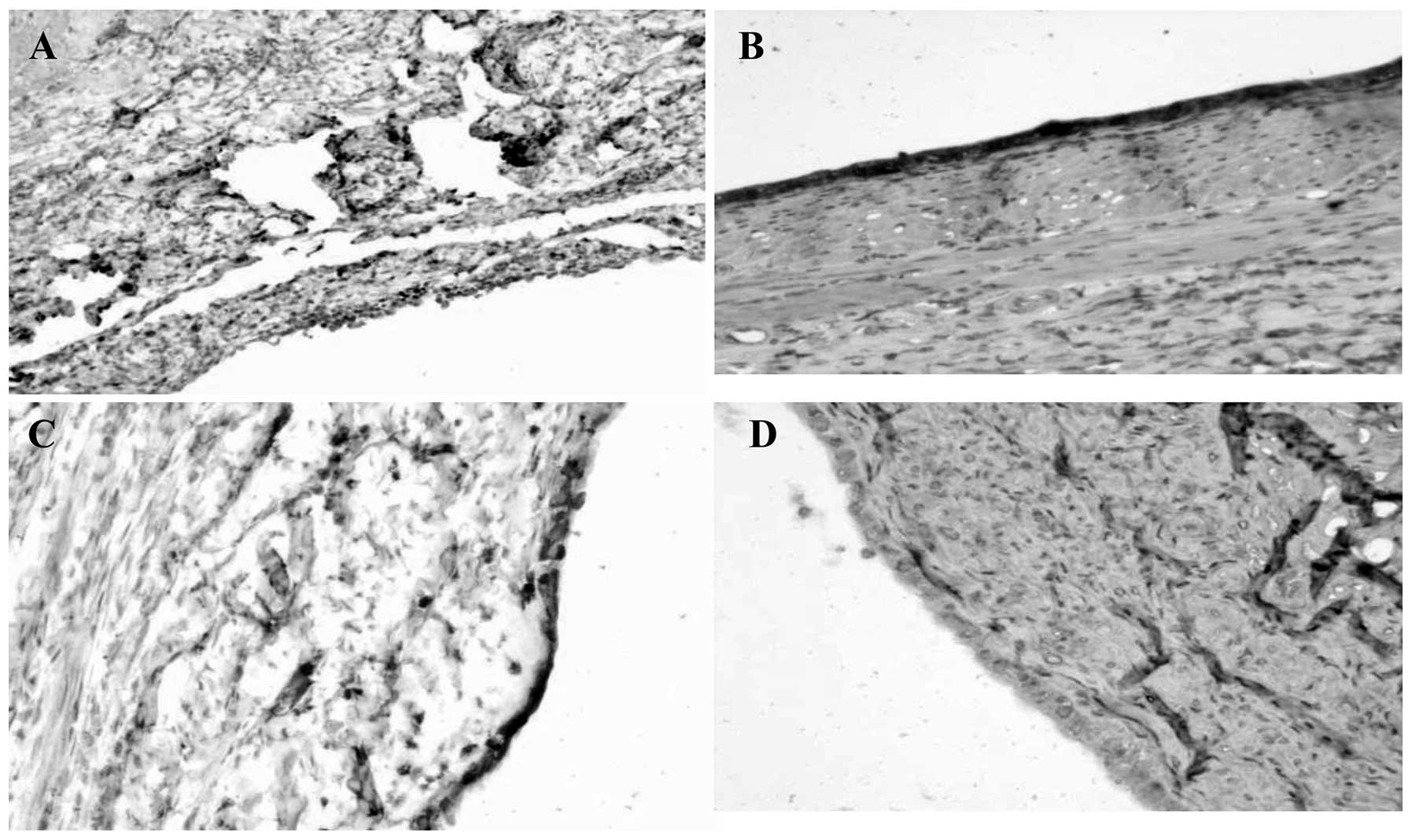|
1
|
Nezhat FR, Shamshirsaz AA, Yildirim G and
Nezhat C and Nezhat C: Pelvic pain, endometriosis, and the role of
the gynecologistPediatric, Adolescent, and Young Adult Gynecology.
Altchek A and Deligdisch L: Wiley-Blackwell; Hoboken, NJ: pp.
174–194. 2009, View Article : Google Scholar
|
|
2
|
Sampson J: Peritoneal endometriosis due to
the menstrual dissemination of endothelial tissue into the
peritoneal cavity. Am J Obstet Gynecol. 14:422–469. 1927.
|
|
3
|
Osteen KG, Bruner-Tran KL, Keller NR and
Eisenberg E: Progesterone-mediated endometrial maturation limits
matrix metalloproteinase (MMP) expression in an inflammatory-like
environment: a regulatory system altered in endometriosis. Ann NY
Acad Sci. 955:37–47; discussion 86–88. 2002. View Article : Google Scholar : PubMed/NCBI
|
|
4
|
Pitsos M and Kanakas N: The role of matrix
metalloproteinases in the pathogenesis of endometriosis. Reprod
Sci. 16:717–726. 2009. View Article : Google Scholar : PubMed/NCBI
|
|
5
|
Wu MH, Shoji Y, Wu MC, Chuang PC, Lin CC,
Huang MF and Tsai SJ: Suppression of matrix metalloproteinase-9 by
prostaglandin E(2) in peritoneal macrophage is associated with
severity of endometriosis. Am J Pathol. 167:1061–1069. 2005.
View Article : Google Scholar : PubMed/NCBI
|
|
6
|
Chung HW, Wen Y, Chun SH, Nezhat C, Woo BH
and Lake Polan M: Matrix metalloproteinase-9 and tissue inhibitor
of metalloproteinase-3 mRNA expression in ectopic and eutopic
endometrium in women with endometriosis: a rationale for
endometriotic invasiveness. Fertil Steril. 75:152–159. 2001.
View Article : Google Scholar : PubMed/NCBI
|
|
7
|
Nap AW, Dunselman GA, de Goeij AF, Evers
JL and Groothuis PG: Inhibiting MMP activity prevents the
development of endometriosis in the chicken chorioallantoic
membrane model. Hum Reprod. 19:2180–2187. 2004. View Article : Google Scholar : PubMed/NCBI
|
|
8
|
Bruner-Tran KL, Zhang Z, Eisenberg E,
Winneker RC and Osteen KG: Down-regulation of endometrial matrix
metalloproteinase-3 and-7 expression in vitro and therapeutic
regression of experimental endometriosis in vivo by a novel
nonsteroidal progesterone receptor agonist, tanaproget. J Clin
Endocrinol Metab. 91:1554–1560. 2006. View Article : Google Scholar : PubMed/NCBI
|
|
9
|
Lee CZ, Yao JS, Huang Y, et al:
Dose-response effect of tetracyclines on cerebral matrix
metalloproteinase-9 after vascular endothelial growth factor
hyperstimulation. J Cereb Blood Flow Metab. 26:1157–1164.
2006.PubMed/NCBI
|
|
10
|
Acharya MR, Venitz J, Figg WD and
Sparreboom A: Chemically modified tetracyclines as inhibitors of
matrix metalloproteinases. Drug Resist Updat. 7:195–208. 2004.
View Article : Google Scholar : PubMed/NCBI
|
|
11
|
Axisa B, Loftus IM, Naylor AR, Goodall S,
Jones L, Bell PR and Thompson MM: Prospective, randomized,
double-blind trial investigating the effect of doxycycline on
matrix metalloproteinase expression within atherosclerotic carotid
plaques. Stroke. 33:2858–2864. 2002. View Article : Google Scholar : PubMed/NCBI
|
|
12
|
Griffin MO, Fricovsky E, Ceballos G and
Villarreal F: Tetracyclines: A pleitropic family of compounds with
promising therapeutic properties. Review of the literature. Am J
Physiol Cell Physiol. 299:C539–C548. 2010. View Article : Google Scholar : PubMed/NCBI
|
|
13
|
Vernon MW and Wilson EA: Studies on the
surgical induction of endometriosis in the rat. Fertil Steril.
44:684–694. 1985.PubMed/NCBI
|
|
14
|
Lebovic DI, Kir M and Casey CL: Peroxisome
proliferator-activated receptor-gamma induces regression of
endometrial explants in a rat model of endometriosis. Fertil
Steril. 82 Suppl 3:1008–1013. 2004. View Article : Google Scholar : PubMed/NCBI
|
|
15
|
Akkaya P, Onalan G, Haberal N, Bayraktar
N, Mülayim B and Zeyneloglu HB: Doxycycline causes regression of
endometriotic implants: A rat model. Hum Reprod. 24:1900–1908.
2009. View Article : Google Scholar : PubMed/NCBI
|
|
16
|
Keenan JA, Williams-Boyce PK, Massey PJ,
Chen TT, Caudle MR and Bukovsky A: Regression of endometrial
explants in a rat model of endometriosis treated with the immune
modulators loxoribine and levamisole. Fertil Steril. 72:135–141.
1999. View Article : Google Scholar : PubMed/NCBI
|
|
17
|
Visse R and Nagase H: Matrix
metalloproteinases and tissue inhibitors of metalloproteinases:
Structure, function, and biochemistry. Circ Res. 92:827–839. 2003.
View Article : Google Scholar : PubMed/NCBI
|
|
18
|
Collette T, Bellehumeur C, Kats R, Maheux
R, Mailloux J, Villeneuve M and Akoum A: Evidence for an increased
release of proteolytic activity by the eutopic endometrial tissue
in women with endometriosis and for involvement of matrix
metalloproteinase-9. Hum Reprod. 19:1257–1264. 2004. View Article : Google Scholar : PubMed/NCBI
|
|
19
|
Pan H, Sheng JZ, Tang L, Zhu R, Zhou TH
and Huang HF: Increased expression of c-fos protein associated with
increased matrix metalloproteinase-9 protein expression in the
endometrium of endometriotic patients. Fertil Steril. 90:1000–1007.
2008. View Article : Google Scholar : PubMed/NCBI
|
|
20
|
Sapadin AN and Fleischmajer R:
Tetracyclines: Nonantibiotic properties and their clinical
implications. J Am Acad Dermatol. 54:258–265. 2006. View Article : Google Scholar : PubMed/NCBI
|
|
21
|
Hoyt JC, Ballering J, Numanami H, Hayden
JM and Robbins RA: Doxycycline modulates nitric oxide production in
murine lung epithelial cells. J Immunol. 176:567–572. 2006.
View Article : Google Scholar : PubMed/NCBI
|
|
22
|
Zhao S, Choksuchat C, Zhao Y, Ballagh SA,
Kovalevsky GA and Archer DF: Effects of doxycycline on serum and
endometrial levels of MMP-2, MMP-9 and TIMP-1 in women using a
levonorgestrel-releasing subcutaneous implant. Contraception.
79:469–478. 2009. View Article : Google Scholar : PubMed/NCBI
|
|
23
|
Pires PW, Rogers CT, McClain JL, Garver
HS, Fink GD and Dorrance AM: Doxycycline, a matrix metalloprotease
inhibitor, reduces vascular remodeling and damage after cerebral
ischemia in stroke-prone spontaneously hypertensive rats. Am J
Physiol Heart Circ Physiol. 301:H87–H97. 2011. View Article : Google Scholar : PubMed/NCBI
|
|
24
|
Björnsson MJ, Havemose-Poulsen A, Stoltze
K and Holmstrup P: Influence of the matrix metalloproteinase
inhibitor batimastat (BB-94) on periodontal bone destruction in
Sprague-Dawley rats. J Periodontal Res. 39:269–274. 2004.
View Article : Google Scholar : PubMed/NCBI
|
|
25
|
Coussens LM, Fingleton B and Matrisian LM:
Matrix metalloproteinase inhibitors and cancer: trials and
tribulations. Science. 295:2387–2392. 2002. View Article : Google Scholar : PubMed/NCBI
|
|
26
|
Preshaw PM, Hefti AF, Jepsen S, Etienne D,
Walker C and Bradshaw MH: Subantimicrobial dose doxycycline as
adjunctive treatment for periodontitis. A review. J Clin
Periodontol. 31:697–707. 2004. View Article : Google Scholar : PubMed/NCBI
|
|
27
|
Lamparter S, Slight SH and Weber KT:
Doxycycline and tissue repair in rats. J Lab Clin Med. 139:295–302.
2002. View Article : Google Scholar : PubMed/NCBI
|
|
28
|
Grümmer R: Animal models in endometriosis
research. Hum Reprod Update. 12:641–649. 2006. View Article : Google Scholar : PubMed/NCBI
|
|
29
|
Uchiide I, Ihara T and Sugamata M:
Pathological evaluation of the rat endometriosis model. Fertil
Steril. 78:782–786. 2002. View Article : Google Scholar : PubMed/NCBI
|
|
30
|
Oner G, Ozcelik B, Ozgun MT, Serin IS,
Ozturk F and Basbug M: The effects of metformin and letrozole on
endometriosis and comparison of the two treatment agents in a rat
model. Hum Reprod. 25:932–937. 2010. View Article : Google Scholar : PubMed/NCBI
|
















